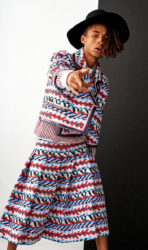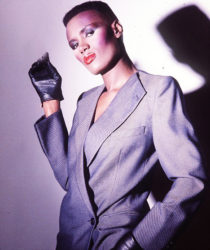Guyana is one bizarre place filled with much hypocrisy. Sometimes it is not until you remove yourself from an environment that you begin to recognize some of the foolishness you once freely entertained. You may have read that and found it difficult and painful to register, but as a straight, girlish, fashion-forward individual, I recognize the privilege that comes with my sexuality and fashion choices. It is rare for me to be harshly judged and ridiculed by society, much less imprisoned, for the things I choose to wear.

Section 153(1) (xlvii) of the Summary Jurisdiction (Offences) Act Cap 8:02 states, “Every person who does any of the following acts shall, in each case, be liable to a fine of not less than seven thousand … dollars –
“(xlvii) being a man, in any public way or public place, for any improper purpose, appears in female attire; or being a woman, in any public way or public place, for any improper purpose, appears in male attire.”

This means that if I were to wear baggy jeans, a white vest and a snapback, with no proper purpose, I would be committing a criminal offence. In effect, cross-dressing is ruled out and according to the law, I dare not explore fashion trends that don’t coordinate with my gender, because who’s to say whether my purpose is improper or not. Sigh! Even writing this makes me question the intelligence of the people who imposed these laws and those who seek to maintain them. As a nation, are we really this daft? I hope not.
I would like to think that we are cognizant of the fact that choice of clothing doesn’t physically harm anyone, whatever type you choose to wear, for whatever purpose, unless, of course, there are some explosives attached. In addition, Guyana is a secular country, which means it holds no religious power to influence people’s way of life.
Of course we aware of all that, the law is just there to create a hierarchy of who is more valuable than whom and who is more worthy of human rights than whom. While it doesn’t say so in laymen’s terms, this is precisely what it does. And by maintaining this law we inspire and encourage hate against those who are different from us.
While it may not seem that way, don’t forget your privilege if you are like me. Don’t forget that everyone may not be like you and may not interpret fashion the same way you do. Other people may have social, cultural, political, economic and other factors that influence their fashion choices, that are different to yours.
The obnoxious law quoted above gives those in authority the power to dictate what one can and cannot wear based on their interpretation of one’s identity. We choose to ignore the fact that this stems from colonization. We seem to want to forget the struggles and trouble wrought by oppression, exclusion and subjective expectations. But we should remember that any form of control and manipulation against someone’s personal desires is criminal.
The hypocrisy of all this lies in the assertion by those in authority that the arts can be used to create inclusiveness and harmony, whilst seeking to control and brainwash the masses with laws and

rules that continue to marginalize and exclude people. And this is in a society that proclaims ‘One People, One Nation, One Destiny!’
Then there is the hypocrisy of the stakeholders, particularly in the fashion field of the arts, who remain tightlipped about stigma and discrimination against the LGBT community when it comes to personal fashion choices. This is sickening really, when one considers that many of Guyana’s fashion industry players are from the LGBT community. Possibly, the environment has mentally trained them to believe that their opinions are as valueless as their contributions to society. But try to imagine the next Chanel may be a Guyanese who is forced to stick within the parameters of acceptable personal identity, which indirectly damages creative expression and ability.
I believe the arts can be used as a tool to help remove the scars of our destructive history and aspects of our disparaging culture. But my question is, how can we use the arts to nurture inclusiveness if we create a hierarchy of whose deemed worthwhile by their choice of fashion? An opinion from whoever is advising on fashion for cultural policy would be great for conversation.
Whether you choose to like it or not, it’s 2016. Personal style will always be trending. Men are wearing skirts. Women are wearing boyfriend jeans. If people want to cross-dress because it is how they identify, it shouldn’t be illegal. There is no such thing ‘an improper purpose’ when it comes to fashion. We dress to suit our mood.
I would like to leave you with a thought. Isn’t it amazing that we are more accepting of people in the LGBT community from North America or Europe, especially those who control the fashion houses? They tend to be boastful of their fashion ideals and trends and they are predominately white. Yet, we turn up our noses at those in the local LGBT community who explore with fashion. Perhaps we should run a check on our collective colonial mentality.





